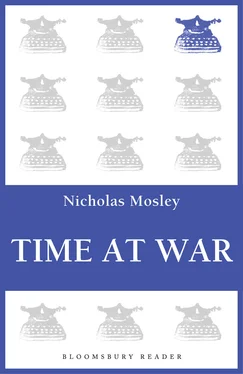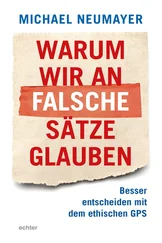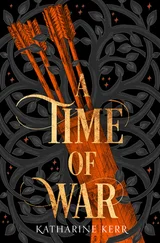I finally reached the rear echelons of the battalion on Christmas Eve 1943 in a mountain village called Pietro Montecorvino. I, aged twenty, and with no war experience, was due to take charge of a platoon of men mostly considerably older than myself who had been fighting for a year through North Africa, Sicily, and a third of the way up Italy, and were exhausted. The Rifle Brigade friend I had been travelling with was posted to a company in another village. So for the first time I was away from anyone I had been friends with.
The first thing that happened to me as I reported for duty at the adjutant’s office was that my kitbag with all my own warm clothing in it was stolen; I had left it propped against an outside wall. I felt this was a calamity worse than my toothache; more desperate than my closeness to the front line. I was told that anything left lying about was pinched in a flash by the impoverished villagers. I could understand this, but could also understand for a moment the urge that must have come upon some Germans, for instance, in occupied countries to take hostages and say — ‘Give us back our property or we will shoot you one by one.’ It was no consolation to tell myself that at least now, with no winter clothing, I would be in the same situation as my men.
What might have been a consolation was the next day’s Christmas dinner which consisted, I wrote in my diary, of ‘turkey, pork, tinned plum pudding and whisky, on which everyone got drunk except me.’ I was still appallingly priggish in my diary: I seemed to disapprove of anyone who was not of the type of my precious coteries from Ranby or Eton. I took refuge in admiring the beauty of the landscape; and on Boxing Day I recorded that I read the whole of Chrome Yellow.
(In old age I find it difficult to acknowledge the awfulness of much of my diary at this time. However, insofar as it seems to have taken the war to knock some of this out of me, this is part of the story.)
After Christmas I went to join one of the forward companies of the battalion, E Company, who were based in a village called Carpinone just behind the very sparsely held front line. Here again I found solace in the landscape — ‘Three thousand feet up, we ourselves are infinitely little beneath the snow-lined mountains which arise fairy-like out of the grey-green scrub twelve miles away: we understand each other, these wrinkled pyramids and I.’ Well, possibly. But also there I met my company commander, Mervyn Davies, who was to play such a large part in my war, and perhaps in easing some of the pretentious stuffing out of me.
Mervyn was a Welshman, some five years older than me, who came from Carmarthen and had been to school in Swansea. He had been commissioned into the Welsh Regiment and then, when he had landed in North Africa, had found himself assigned to the London Irish Rifles through much the same chain of circumstances as me. He had fought with them in Sicily and at Termoli and at the battle of the Trigno river; he chose to stay with them, as I was to do later. When I met him in the cold stone-lined room that was the officers’ quarters in Carpinone, he was tall and quiet and watchful: I thought — Rather like Gary Cooper. How does one recognise someone who is going to play an important part in one’s life? By some such instinct as that by which I had claimed to recognise my ‘wrinkled pyramids’? He was unlike any of the friends I had had in the army or from school. My first reference to Mervyn in my diary was, ‘He has actually read The Mill on the Floss! ’
We established a friendship through talking about books. He hoped, as I did, that the war would not totally disrupt required reading — required, that is, to try to understand what on earth humans were up to. We applied ourselves dutifully to army life, but hoped to gain a vision of what should make life valuable beyond it. In later life Mervyn became a barrister and then a High Court judge. I used to say that he was the first good man I had known.
The two battalions of the 2nd London Irish and the 1st Royal Irish Fusiliers were given the test of holding a line in the mountains some twelve miles long with platoons dotted here and there on isolated slopes. The Germans would be able to overlook most of these from a higher ridge beyond. The Allied left flank had been halted just short of Monte Cassino. It was in the centre that the line had become seriously undermanned.
In the mountains blizzards often made visibility almost impossible. When this happened E Company remained based in the village, but even then we had to go out on patrol each day supposedly to see what the enemy were up to. We would blunder through thick snow for two or three hours and then sit huddled under the lee of a snowdrift seeing nothing, until it was time to totter back to our room in the village where, with luck, wood had been collected for a fire. In my diary I would record anything unusual that had happened in the snow: ‘Big moment when given baptism of fire by a few desultory shells and mortar bombs, none closer than 300 yards but horrible whine as they drop overhead.’ Then back in the comfort of the village, Mervyn and I would hazard opinions about books. I recorded, ‘Mervyn began to quote T. S. Eliot’s “Footsteps echo in the memory …” and with what delight did I carry on with “… towards the door we never opened into the rose garden”.’
We had little contact with the local villagers, some of whom remained grimly huddled in their cellars. However to my sister I wrote that once I had ‘ferreted out a famous Italian tenor who lives in the village, and we had the most glittering evening with him bellowing all the great arias too beautifully, accompanied by his brother-in-law on a watery piano.’
Then the weather cleared and the time came for the LIR to go into semi-permanent positions in the hills. It was still very cold; none of us yet had suitable clothing; some of the men were getting frostbite. I had seen comparatively little of my platoon when we were in the village; they lived and ate and slept in a different part of our building, and perhaps I was shy of them because I felt they must see me as an ignorant intruder. And when we were on patrol the snow and the wind were such that it was difficult to speak, let alone to get to know anyone. Yet had I not glimpsed at Ranby that the functioning of a good platoon depended on the nurturing of trust and affection?
Our position in the hills was on a mountain called Montenero — a wooded slope rising to higher ground on the left and falling away to a valley in front. Across the valley, on a higher ridge, was what we understood to be a stretch of the German Winter Line. But we had not yet seen any Germans; and all we knew of them was from the occasional mortar and artillery shells that came whining and whooshing as if from nowhere.
The snow was too thick and the ground was too hard to make proper trenches; the men of the three sections of my platoon — 7 Platoon — made shelters in the snow as deep as they could; and in these they had to stay during the day and while on sentry duty at night. Each section consisted of a corporal and nominally ten men but often less owing to frostbite and sickness. Two men in each section were responsible for carrying and working a Bren machine-gun, and the rest were equipped with Lee-Enfield rifles not much developed since the First World War. At platoon headquarters there were myself and the sergeant and a runner, two men with a 2-inch mortar, and an operator for the radio, which often did not work. Headquarters was in a tent with snow piled up outside it like an igloo, and inside a brazier which emitted smoke that should not be allowed to escape or it might betray our position. Here men from the sections who were not on sentry duty came to join us and try to sleep at night; the choice seemed to be between freezing and asphyxiation. Two or three times a night I would visit the sentries with a rum ration; and either my sergeant or I would try to sleep, wearing the earphones of the wireless, which was our connection to company headquarters further down the slope on the right. During the day the men in my platoon would slither down the slope two or three at a time to the company cookhouse to eat stew out of a tin with a spoon; I might manage to have a brief chat with Mervyn. Each morning the section commanders assembled in my tent to receive their daily orders. E Company was scheduled to stay in these positions for periods of three days at a time.
Читать дальше












